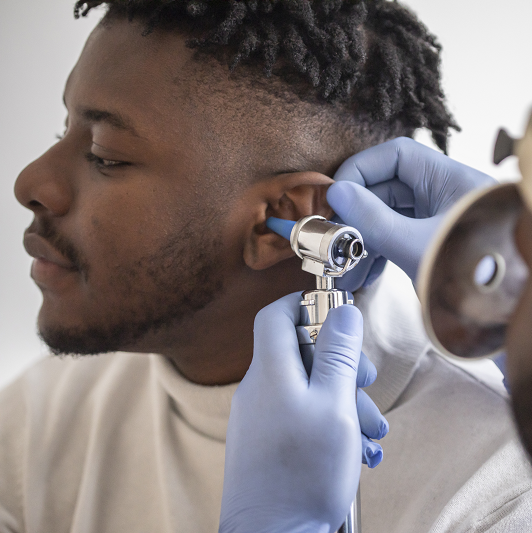Can Loud Toys Cause Hearing Loss?

February 01, 2024
You might expect older adults to be hard of hearing, rather than children. But loud toys, earbuds and other devices put kids at risk of hearing loss.
“Noise is the leading cause of hearing loss, not advanced age,” says Virginia Gural-Toth, AuD, CCC-A, Manager of Audiology, Tinnitus and Balance Programs. “Children are more susceptible to hearing loss because they’re still growing and developing.”
Children don’t realize they should distance themselves from noise or wear hearing protection. They rely on their parents for guidance, but parents may unknowingly purchase loud toys.
“Noise sounds even louder to children because their ears aren’t fully developed,” Gural-Toth says. “Their smaller ear canals lead to increased sound pressure, resulting in louder noises.”
Exposure to 85-decibel noise – lawnmowers, city traffic – increases the risk of hearing loss. When adults are exposed to 85-decibel sounds at work, they need hearing protection.
Toys that emit 85 decibels or more may be harmful to children’s immature ears. Noises above 85 decibels gradually, permanently damage delicate structures within the ears.
Noisy Toys, Earbuds and Other Loud Devices
Many toys that children play with on a regular basis emit 85-decibel noises. Talking dolls, cars with sirens, musical instruments and squeaky toys may all harm hearing.
How can you tell if toys are too loud? The Sight and Hearing Association (SHA) periodically releases a “Noisy Toys List,” ranking offenders.
SHA measures decibel levels when toys are 10 or zero inches away. Some surpass 85 decibels at 10 inches; nearly all exceed 85 decibels at zero inches.
Young children may place loud toys against their ears (zero inches away) while playing. 90 decibels at arm’s length sounds like 120 decibels pressed against the ear.
“Children can sustain permanent hearing damage quickly from high-decibel noise,” Gural-Toth says. “The louder a sound is, the less time it takes to damage hearing.”
Earbuds or personal listening devices may also damage hearing. Children and teens are increasingly using these devices, without recognizing the hazardous noise exposure.
Hearing Safety for Children
To protect your child, limit their exposure to loud toys early and throughout childhood.
“Ongoing exposure to toys that emit 85 decibels can harm children’s permanent hearing,” Gural-Toth says. “Hearing loss may cause problems like difficulty learning or socializing.”
Try to protect your children from exposure to harmful sounds.
“Parental awareness of noise exposure is important from a young age, beginning with infants,” Gural-Toth says. “The impacts are cumulative, so limiting noise throughout childhood helps.”
To reduce your child’s noise exposure, pay attention to their toys:
- If toys have adjustable volume, use the quietest setting
- If the volume isn’t adjustable, place tape over the speakers to reduce the volume
- Remove the batteries to silence loud toys
- Download an app that can measure decibel levels, then check loud toys
- Test new toys before you give them to your child
- Set time limits for playing with louder toys
- Return toys that are louder than 80 decibels, if possible
- Use hearing protection devices for your child when noise levels can’t be changed
- Infants and young children should wear over-the-ear earmuffs
- Older children may wear earplugs or earmuffs
Schedule an early childhood hearing assessment to measure your child’s baseline hearing. Take them for checkups regularly, especially if they’re exposed to loud environments or toys.
“If something is too loud for you, it’s too loud for your child,” Gural-Toth says. “Noise exposure is the only completely preventable cause of hearing loss, so take action.”
Next Steps & Resources:
- Meet our source: Virginia Gural-Toth AuD, CCC-A
- To make an appointment with Drs. Gardilla, Rodriguez Bostock or another physician near you, call 800-822-8905 or visit our website.
The material provided through HealthU is intended to be used as general information only and should not replace the advice of your physician. Always consult your physician for individual care.






